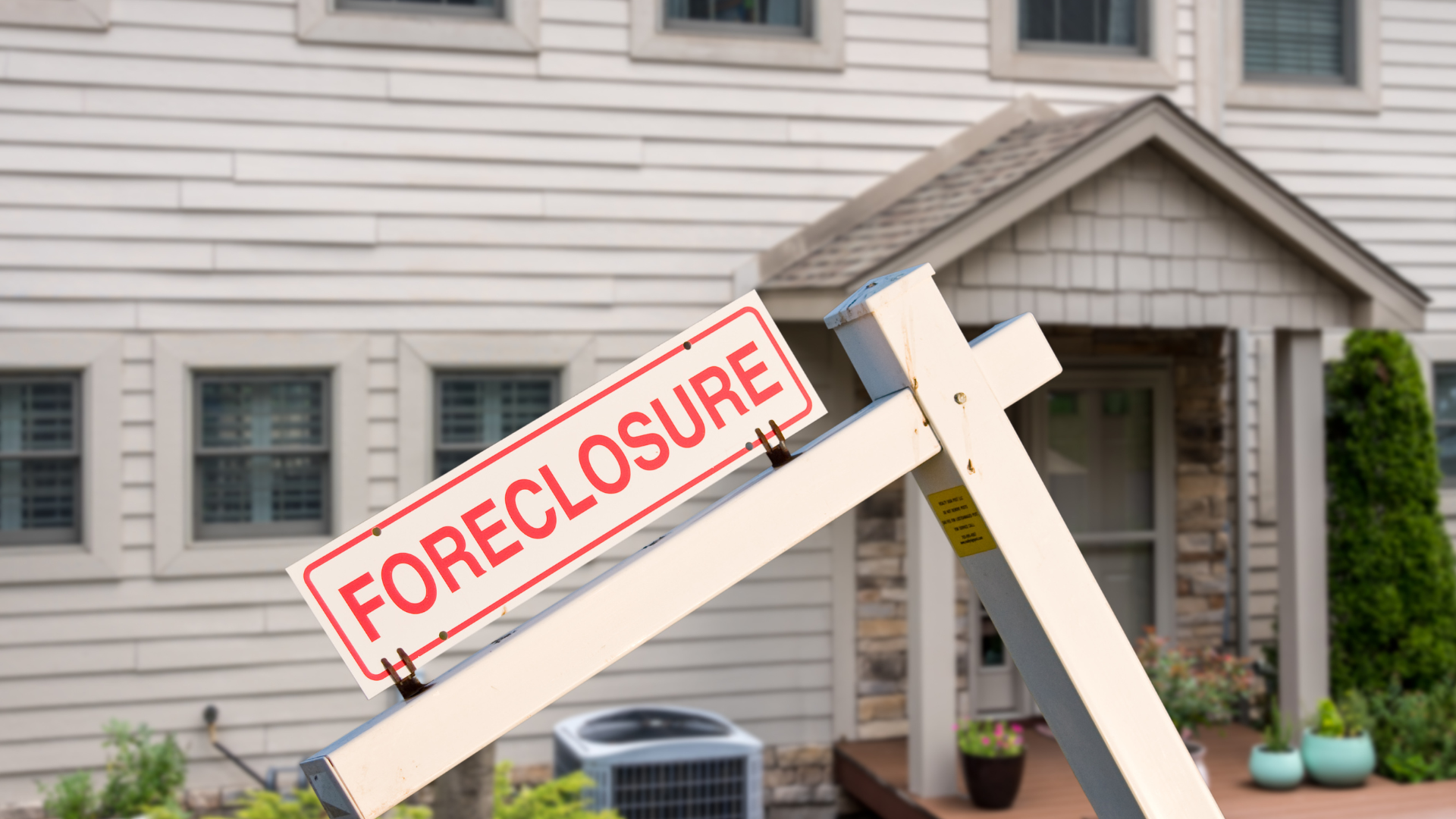We understand that facing foreclosure can be an overwhelming and stressful experience for homeowners. Our goal is to empower you with the knowledge and resources necessary to navigate this challenging situation. To effectively avoid foreclosure, it’s essential to understand how the process works.
Once you’ve reviewed the information below, you should be able to identify how far along you are in the foreclosure process and what necessary steps to take next. If you decide that selling your property is the best option, we are here to help—whether you choose to sell directly to us or list it on the MLS.
For listing assistance, we recommend reaching out to our recommended realtor.

What is Foreclosure?
Foreclosure is the process that happens when a homeowner can’t keep up with their mortgage payments. When this occurs, the lender has the right to take back the property. It usually starts after a few missed payments, during which the lender may try to work with the homeowner to find a solution. However, if an agreement can’t be reached, the lender will move forward with foreclosure.
During foreclosure, the lender can take possession of the home and sell it at a public auction to recover the money owed. This can be a difficult experience for homeowners, as it can lead to the loss of their home and damage to their credit score. It’s important to know that foreclosure laws can vary by state, so homeowners facing this situation should understand their rights and the options available to them.
How Long Is the Pre-Foreclosure Process in Texas?
In Texas, the foreclosure process is known for being relatively quick compared to other states. Once the lender initiates foreclosure proceedings—typically after the homeowner has missed several payments—an uncontested foreclosure can be completed in as little as 42 days. This timeline begins after the lender files a Notice of Default and serves the Notice of Sale, which must occur at least 21 days before the auction date.
Generally, before foreclosure begins, a homeowner must be more than 120 days delinquent on their mortgage payments. During this pre-foreclosure period, the loan servicer will reach out by phone, mail, and email to discuss the missed payments and offer potential options to avoid foreclosure. This 120-day period applies to both judicial and non-judicial foreclosures, Texas included.
Example: Suppose your mortgage payment is due on July 1st, but you don’t send a payment to the servicer. You’re one day delinquent on July 2nd, even if you get a grace period under the terms of your loan agreement. On July 31, you’re 30 days delinquent, and so on. After 120 days of delinquency, the servicer may begin the pre-foreclosure process.
It’s crucial to note that if you contest the foreclosure or if there are legal complications, the process can take longer. Additionally, once the property is sold at auction, Texas law does not allow for the previous owner to reclaim it.
Here’s a Breakdown of the Texas Foreclosure Process:
- Missed Payments: Once a borrower falls behind on their mortgage payments, the lender typically begins reaching out by phone, mail, and email to inform the borrower about missed payments and potential options to catch up.
- Notice of Default: Texas requires a formal Notice of Default after 120 days of missed payments. The lender issues this notice, which officially initiates the foreclosure process. It’s important to note that Texas is a non-judicial foreclosure state, so the process does not require court involvement unless the borrower contests the foreclosure.
- Notice of Sale: If the loan remains unpaid, the lender will send a Notice of Sale at least 21 days before the scheduled foreclosure sale date. This notice must be sent by certified mail to the borrower and posted publicly, usually at the county courthouse.
- Foreclosure Auction: Foreclosures in Texas are typically held on the first Tuesday of each month. The property is auctioned at the county courthouse, where it’s either sold to the highest bidder or reverts to the lender if no acceptable bids are made.
- Eviction: If the property sells at auction, the borrower may be required to vacate. Texas law allows the new owner to initiate eviction proceedings if the borrower does not leave voluntarily.
The Texas foreclosure process is generally faster than in many states due to its non-judicial nature, but borrowers still have options to prevent foreclosure, such as loan modifications or repayment plans.
Ways to Avoid Foreclosure In Texas:
- Contact Your Lender Immediately
Reach out to your lender as soon as you miss a payment or anticipate missing one. Lenders may offer temporary solutions, such as forbearance, to provide short-term relief while you get back on track. - Loan Modification
Request a loan modification to make your payments more manageable. This could involve adjusting your loan’s interest rate, extending the loan term, or reducing your principal. Lenders often work with homeowners to modify loans to help them avoid foreclosure. - Forbearance Agreement
A forbearance agreement temporarily reduces or pauses your mortgage payments. This can be beneficial if you’re facing temporary financial hardship. You’ll need to repay the paused amount, but it can offer breathing room while you regain stability. - Reinstatement
Reinstatement allows you to pay back your missed payments in a lump sum by a specified date to bring your mortgage current. Texas law permits reinstatement up until the foreclosure sale date, providing you time to prevent foreclosure if you can gather the necessary funds. - Repayment Plan
If you’ve missed only a few payments, you might be able to negotiate a repayment plan with your lender. This plan spreads out your missed payments over a designated period, typically added to your monthly payment. - Refinancing
If you have sufficient equity and qualify, refinancing can lower your interest rate or extend your loan term, making payments more affordable. While this option may not be suitable for everyone, it can help prevent foreclosure for some borrowers. - Texas Mortgage Assistance Programs
Programs like the Texas Homeowner Assistance Fund (HAF) provide financial aid to eligible homeowners who are behind on mortgage payments due to hardships. These funds can help pay off some or all missed payments to bring your mortgage current. - Short Sale
If you owe more than your home is worth, a short sale might be an option. In a short sale, your lender agrees to accept less than the mortgage balance as payment in full. Although this requires lender approval, it can prevent foreclosure and limit credit damage. - Deed in Lieu of Foreclosure
With a deed in lieu of foreclosure, you voluntarily transfer ownership of your property to the lender, who then cancels your debt. This option is a last resort but can help you avoid the formal foreclosure process and may be less damaging to your credit. - Explore Government Assistance Programs
Look into federal or state programs designed to assist homeowners at risk of foreclosure. Programs like the Home Affordable Modification Program (HAMP) can provide relief by modifying loans for struggling homeowners. - List Your Property with a Real Estate Agent
Depending on how much time you have before foreclosure, listing your property with a real estate agent can help you find a buyer more quickly. A good agent can market your home effectively and negotiate on your behalf. - Sell Your Property to a Home Buying Company
Consider selling your property to a home buying company for a fast and convenient sale. These companies often buy homes as-is, allowing you to close quickly and alleviate the stress of foreclosure.
How Long Do You Have To Get Out of Your House After Foreclosure?
The Different Types of Foreclosure
There are two different types of foreclosure you may experience: nonjudicial foreclosure or judicial foreclosure.
What Is Non-Judicial Foreclosure?
A non-judicial foreclosure is the fastest and cheapest way for a lender to foreclose on your Texas property. It does not require taking you, the homeowner, to court and can be completed according to state statutes. In the case of non-judicial foreclosure, your lender repossesses your home to sell it and recover whatever debt is owed using what’s called a “power-of-sale” clause in the deed of trust. Not every state allows for this option but, if yours does, the lender will generally choose it to avoid any court costs.
What Is Judicial Foreclosure?
In states that require judicial foreclosure, your lender must file a lawsuit asking the court to issue an order to allow for the sale of the home. The lender must provide you with this letter. Whether you agree or not, you must respond to the letter or the lender will automatically win the case and be allowed to put your home up for a foreclosure sale. When the house is sold, you are still required to pay the difference between what you still owe on the mortgage and the amount the house sold for.
Auctions are not like regular home sales and generally the house is not sold for market value. This means that even if your house is in great shape and worth a lot more than what is left on your mortgage, you may still find yourself owing tens of thousands (if not hundreds of thousands) of dollars for a house you no longer own! This is called a deficiency judgment. It’s an expensive and long process for lenders to take to try and recoup their debt, which is why most prefer a non-judicial foreclosure.
Get an offer today, sell in a matter of days.
Sell Your House To Avoid Foreclosure in Texas
Let’s break down a few ways you can sell your house, depending on your time frame and situation:

Hire A Real Estate Agent
When selling a house or property, the first step many Americans consider is reaching out to a local real estate agent. While this option can offer valuable benefits, especially in challenging situations like foreclosure, it’s essential to weigh the pros and cons.
A skilled real estate agent can effectively market your property on the MLS and assist with preparations for open houses and showings, leveraging their expertise to attract potential buyers. Their commission, which can be up to 6%, may seem like a significant expense, but for some homeowners, it could be a worthwhile investment to navigate the complexities of selling during a difficult time.
However, if you’re in a situation where you owe more on your mortgage than your home is worth, or if you’re already facing a substantial amount of debt, the prospect of paying a commission can feel daunting. In such cases, every penny counts, and the 3% to 6% commission might represent a considerable portion of your final sale price.
Additionally, there’s often the fear of not knowing when your house will actually close. While reputable realtors may promise to find the right buyer, the reality is that you may still need to wait 30 days or more for a traditional closing. For homeowners facing imminent auction and eviction, even a month can feel like an eternity.
Ultimately, the decision to work with a real estate agent should be based on your specific circumstances. Their support can be invaluable, especially when you choose a reputable agent. If you believe your situation calls for the assistance of an agent, we recommend visiting our preferred realtor to explore your options.

Short Sale
If you owe more on your house than it’s worth, your realtor may require what is called a short sale. A short sale is necessary when you owe more on your house than the property is currently worth. For example: if you owe $200,000 on your house but in the current market it’s only worth $150,000, you must deal with a short sale. Though it may seem like a good option, it won’t be fast or easy.
To start off, you’ll first need to get your lender’s approval. To qualify for a short sale, you must prove financial hardship using documentation such as W-2s, medical bills, etc. For a situation such as loss of income, the lender will require that you prove that the loss of income is long-term and unlikely to turn around in your favor. If the lender approves the short sale, you will need to find a real estate agent and attorney that specialize in short sales, and they will still charge you the same amount as they would if you were selling your house with a traditional home sale.
If your foreclosure hasn’t dragged on for too long and you’ve maintained contact with your lender, it’s likely that they will approve the short sale. This allows them to avoid the time and expense of trying to foreclose on your property, while still recouping some of the loss from the missed mortgage payments. But for the regular American homeowner, the short sale will follow them for the next 5 to 7 years.
You may have sold the house and been able to pay off some of your debt, but the short sale can damage your credit the same as if you had declared bankruptcy. The credit unions include the delinquency on your mortgage(s) to your lenders and the short sale on their records, making it nearly impossible for previous homeowners to get a credit card, buy a car, or move into a new house or property for the same amount of time as a bankruptcy.

Sell Your House AS-IS to A Cash Buyer
If you’re under a strict time restraint to sell your house before a foreclosure progresses to auction and eviction, you do have options! You can try to sell your property with a real estate agent, work with your lender to complete a short sale, or – best of all – turn to a trusted and reliable cash investor to help you with your situation.
Some of the benefits of selling to a direct cash investor include:
- A quick and pain-free closing process.
- Avoid paying any commissions or fees.
- You won’t have to worry about marketing your house and waiting for a buyer.
- No need to clean-up or complete any repairs!
When you sell your home as-is to a direct cash buyer, you not only can avoid losing your home to an auction, but you also may be able to sell the property for enough money to get out of financial debt. Moving on with your life without the burden of a monthly mortgage payment and debt hanging over your head is one of the best gifts you can give yourself!
Can You Stop Foreclosure Once it Starts in Texas?
Pay Off Your Loan & Fees
You’ve found yourself in a difficult situation. Your debt is adding up while your finances remain the same. It’s time to get serious and look at ways to pay down your debt quickly. Do you have any items you can liquidate? Maybe you have friends or family that can gift you money or provide you with a loan until you get back on track. If you are serious about paying down your debt and stopping foreclosure, you may need a financial professional to help you restructure your budget. Use one of these solutions or combine them all to help climb that avalanche of debt and get back to living a life free of stress.
Declare Bankruptcy
As a last resort, bankruptcy may help you stop the foreclosure of your home but it comes with a high cost. The bankruptcy process is complex and will require a lawyer that specializes in bankruptcy law. If the court approves your petition, you will be entered into a government-approved credit counseling program and the bankruptcy will be reported on your credit report for 7 years. A bankruptcy affects all areas of your life, including when you try to purchase a car, apply for a credit card or bank account, and can disqualify you from future rentals.
The Homeowner Affordability and Stability Plan (HASP)
If your debt is higher than your income, you may be eligible for the Homeowner Affordability & Stability Plan (HASP). HASP is a loan modification program targeted at borrowers who are at risk of foreclosure due to insufficient income. This government program was designed to help homeowners in the United States restructure their monthly payments to fit a limited budget. Apply for the program here to see if you qualify.
Related Articles
5 Ways the Foreclosure of Your Texas House Will Impact You in the Future
What Homeowners in Texas Can Expect During the Foreclosure Process
The Difference Between Pre-Foreclosure and Foreclosure for Homeowners in Texas
How to Sell Your House During Bankruptcy in Texas
Stopping the Foreclosure Process: A Guide for Texas Homeowners
Sell Your House Fast to a Texas Cash Buyer
Are you ready to sell your house but don’t have the time to wait 30+ days for a traditional close? Does a short sale seem like a fast way to ruin your credit? Prefer to pay off all your debt at once and get the bank off your back fast? A direct home buyer and cash investor might be exactly the solution you’ve been searching for! When you work with a trusted and reliable investor with a great reputation in your area, you’ll find a helpful company with cash on hand that is ready to purchase your home from your as-is. With a cash buyer, you can skip the lengthy process of foreclosure, eviction, and auction within a matter of days, and save your credit as well!
You may not get full market value for your house or property when you sell to a trusted cash investor, but the timeliness of a fast closing, and the lack of fees, required inspections, and commissions often balance this out at close. Best of all, because an investor can close fast, you can often close before the bank is able to auction off your property! This means you can sell the property for the amount that benefits you versus the pennies to the dollar price the bank will often try to sell your house for just to get it off the books.
We Buy Houses in Foreclosure & Pre-foreclosure–
Get Your Offer Today!
Does the idea of finally walking away from a property without the storm cloud of foreclosure hanging over your head? Contact a real professional at Flippin' Keys to find out more and get a fair cash offer for your property today.

